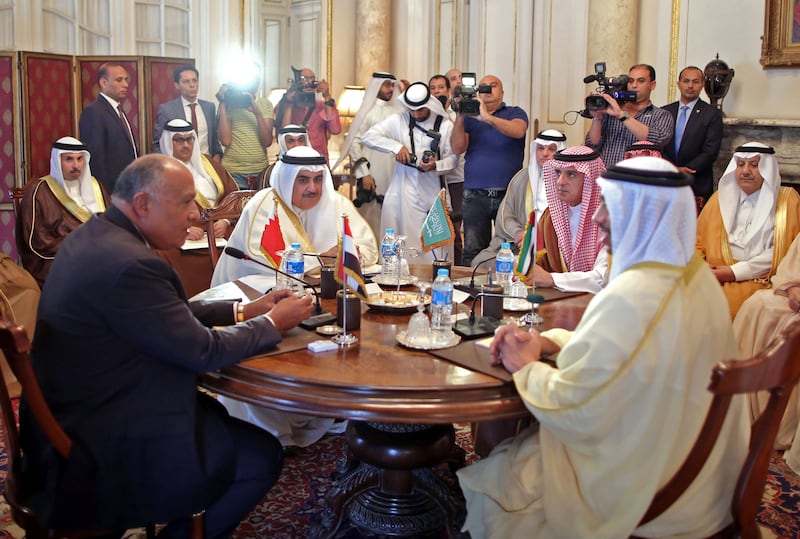Two meetings today – one in Cairo, one in London – revealed the contrasting tones of regional politics. One was chaotic, the other conciliatory.
In London, Qatar's foreign minister, Sheikh Mohammed bin Abdulrahman Al Thani, was busy burning bridges even though he claimed to be building them.
In wide-ranging comments, he said that the list of demands delivered days ago by Saudi Arabia, Bahrain, Egypt and the UAE was conceived to create "anti-Qatar sentiment in the West". This, of course, is the stuff of fiction.The quartet is interested in finding solutions to a regional crisis rather than searching for answers at large.
Those who stand against Doha seek only to push Qatar in a more functional direction – by reducing ties with Iran and cutting links with extremists – and away from sowing the seeds of discord and disharmony. Sheikh Mohammed said he sought a healthy and constructive relationship with Tehran. Why not, one wonders, seek the same friendships with those on this side of the Gulf?
The quartet of nations is focused on curbing bad behaviour within its neighbourhood, rather than trying to bend ears in Europe and America. To the UAE and its allies this is a regional dispute. To Qatar, this is an opportunity to claim it has been victimised and to kick up a broader storm.
Meanwhile, in Cairo, a more coherent conversational tone was emerging. The four nations talked of protecting the key tenets of security and stability. There was emphasis on quiet diplomacy and firm leadership. Where there had been hue and cry in London, there was honesty and hard calculations in Cairo.
The next steps, they said, would be taken at the right time, but make no mistake, they would be taken.
So what now for Doha? Its future depends on understanding nuance. It depends on listening to and acting upon the quartet's advice. It also depends on it understanding that time is not on its side. Doha must understand that it must change its ways.
The Cairo group of nations has said that it will continue to meet, monitor and discuss the situation, but Doha must not interpret political calculations as procrastination.
Speaking in Cairo, Sheikh Abdullah bin Zayed, the Minister of Foreign Affairs, said: "It is important that we exert all efforts … We must do everything to free the region of anyone who may spread dissent and chaos.
"The Arab region has a lot of hope," he said.
It also has a lot of expectation. The quartet expects Qatar to follow the right course. Now we must hope it does.
Doha is still tone-deaf. It must start to listen
Doha must not interpret political calculations as procrastination.

Comment Latest
COMMENT




